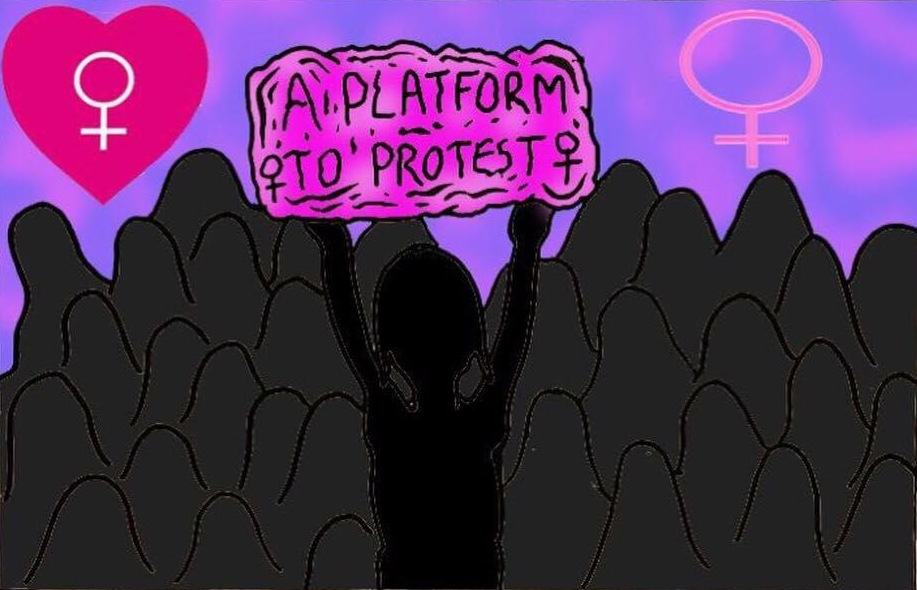A Platform to Protest
by Rebecca Flynn
I tried to intellectualise this article, but I realise I have no experience in journalism - or much other writing to be honest. What I do have is untold experience in elaborating my opinions, and would like to think of myself as a debater of healthy proportions (although my parents may disagree with the ‘healthy’). What I've always felt I have lacked, however, is a platform.
I’m always sceptical as to the source of the information fed to me on social media sites. Let’s be honest, this is the main way we express and share everything, even when it’s written by those with no evidence and no thought for the consequences of spreading false information. I have read some articles soaking in propaganda, and wondered how on earth anyone has bought into such rubbish… and then, lo and behold, someone on my feed has shared it. *Delete*.
It’s difficult to actively protest anything of importance to me on Facebook or Twitter when the whole medium is plagued by false and misleading information. Each time I have posted anything of significance (a protest, if you will) I've felt my opinions instantly become cheap; a flicker; read and disregarded, `liked` and forgotten by a few with a singular experience. It’s hard to write anything more than one dimensional without feeling like I’m blabbering on. It’s as though anything of importance needs another space - not a closed, ‘clique’ chat room where everyone already agrees with each other, or a stage in the middle of the park where you immediately become a spectacle. No, if we want a space to protest, it has to be somewhere other than just social media.
For every beautiful, touching story I see of progress or enlightenment, I see ten comments written underneath of ignorance. Of course, there has always been ignorance. There has also always been those who have attempted to limit the freedoms of others, deeming that certain people are unworthy of making economical and societal decisions. To date, protests have given a voice to the victims of this oppression and have changed things for the better.
From 19th century suffragettes striving for the right to vote, to modern protests like THE SLUT WALK of 2011 calling out the outfit shaming victims of assault, it’s clear that protest can lead to pinnacle developments in history. A key element of this is being part of shared voice, a congregation of people with a singular, vital notion. It’s this sense of inclusion that aids the fight for liberation.
And yet, I don't feel free.
I have the vote, I have the right to earn my own wage, to live on my own, divorce, travel, have a child or not have child. I am a western woman living in a western world enjoying the luxuries that the sacrifices of others allowed me to have. To the naked eye, my freedoms are boundless. Even still I find myself constantly preoccupied with my image. Not just in relation to how 'pretty', 'sexy' or 'fit' I am, but in my continuous effort to be seen for more than just how I look. I know there is a subliminal force dictating which beauty standards I hold myself to. I know this because I have an overwhelming urge to challenge them, and to challenge the idea that attractiveness is a woman’s most important asset. I can see women beam with pride when others rise against this form of oppression, and yet they struggle to do so themselves. They struggle to be heard as a single strength, who can together diminish false beauty standards. It's no easy task.
How do we move forward? How do we march against our oppressors? They are the billboards and the reality TV shows, drilling into our consciousness, into our very being. How do we protest against everything? I suppose we revolutionise the concept of protest.
Ultimately, we may need to find a new way to fight the good fight. I don't think pointless online comment debates are the future of protest. Sometimes it feels like our lives are so jam-packed that we don't have the time for revolutionary protests and marches either. I know mine is. Juggling further education, a job and some sort of social life, I couldn't possibly imagine where the time would come from to plan and execute a rally big enough to make a difference.
We must start with ourselves; to look at our own insecurities and question how and why they have developed. We must seek more from ourselves than a perfect exterior. We also need to look at a collective way to discuss and protect each other from major negative influences such as the media stereotypes. It is starting. People want there to be more, and there is a movement emerging to be freed from insecurity caused by the impossible standards of billboards and reality TV. Our oppressor has evolved into a subliminal force that cannot be easily targeted – but we are evolving too.
So, there you are, we need something else. We need a new way to collaboratively express the changes we want to make, a way to free ourselves from the oppression which has led to such insecurities within ourselves. We need a new platform to protest.
Title image by Dan Skez Art





